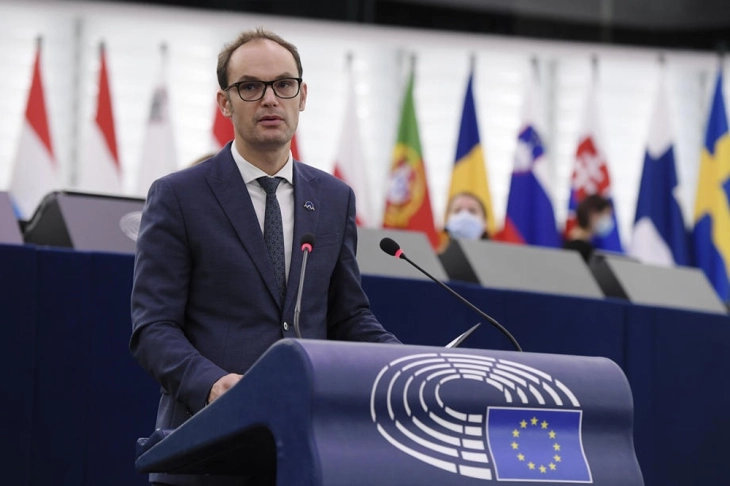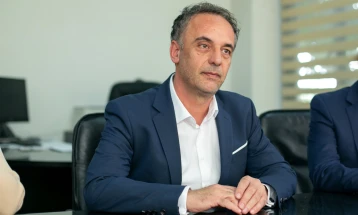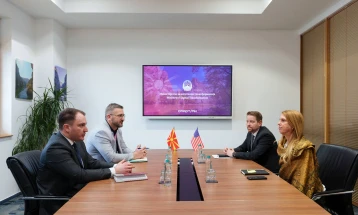Western Balkans’ path to EU not motorway, but winding road with many detours, Slovenian FM Logar tells European Parliament

Strasbourg, 21 October 2021 (MIA) – Two days after the European Commission released the 2021 Enlargement package, the European Parliament discussed at a plenary session on Thursday the European Council and European Commission’s declaration on the conclusions of the EU-Western Balkans summit. During a two-hour debate, most MEPs expressed support for the European perspectives of the region and disappointment in the fact that the summit held in Brdo, Slovenia, failed to present it with a clear future, which, they stressed, would have encouraged implementation of reforms, MIA’s correspondent reports.
During the debate, they called for start of negotiations with North Macedonia and Albania.
In regard to the European perspectives of the region, only the far-right wing is expressing reservations.
MEPs stressed that the summit didn’t produce concrete offers to Western Balkan countries. Almost all discussion participates called for dates for holding the first intergovernmental conferences with North Macedonia and Albania to be set by the end of the year, during the Slovenian Presidency.
According to MEPs, both countries have met preconditions, reiterating that the EU hasn’t.
Although Bulgarian MEP and EP Rapporteur for North Macedonia Ilhan Kyuchyuk presented a constructive address, his fellow Bulgarian MEP Angel Dzhambazki once again accused North Macedonia of “destroying Bulgarian military cemeteries, denying Bulgarians in the country their right to self-determination, discriminating against them and using hate speech.” Other Bulgarian MEP Andrey Kovatchev called for Tito’s communist past and legacy to be left behind.
MEP Thomas Waitz commented on Dzhambazki’s accusations and Bulgaria’s veto.
“The EU gave clear conditions for starting talks to North Macedonia and Albania and both countries have fulfilled all the requirements for starting negotiations, not for membership. They are also exactly the platform to talk about bilateral disputes. I call on Bulgaria to lift the deadlock,” he said.
Waitz also directly addressed Dzhambazki.
“As far as I know your party hasn’t been re-elected to the Bulgarian Parliament twice, so Bulgarian citizens aren’t supporting your hate speech and deepening of the division. It would be really important for Bulgaria to stand together with European partners, lift the deadlock and start negotiations,” Waitz stressed.
According to MEPs the majority of the population in the region is still pro-European, but that majority is shrinking. They asked stakeholders, and especially Bulgaria, not to wait too long or the credibility of the European Union will sink and leave room for other countries, such as Russia, China and Turkey to exert their influence.
Mairead McGuinness, European Commissioner for Financial Stability, Financial Services and the Capital Markets Union, shares that position. She underlined that resolving open disputes between North Macedonia and Bulgaria should be top priority.
Slovenia’s Foreign Minister Anže Logar stressed on Thursday that criticisms voiced by the European Parliament are not directed at the Council presidency, but at those who oppose the accession of Western Balkan countries.
“Dissatisfaction over the accession of Western Balkan countries sends a clear message to the EU and proves that institutions and countries in the region should speed up progress,” he added.
The FM also acknowledged that the summit didn’t provide satisfactory progress, but stressed that the Western Balkans’ road to the EU is not a motorway, but a winding road with many detours.
Slovenia’s top diplomat underlined that decoupling counties in the region on their EU path would be a mistake.
“North Macedonia has met requirements, but unanimity from all 27 member states is currently lacking,” Logar said.
He noted that the summit’s success lies in the portion of the declaration that calls for similar meetings to be held on a regular basis in order to discuss perspectives and progress. The next summit, the FM added, will be held under the Czech presidency.
“We have it in writing that Western Balkan enlargement is our joint strategic goal. We also reaffirmed the investment plan and pledged to support COVID-19 vaccination,” Logar stressed.
This, he added, should inspire countries to implement reforms and refute the arguments of enlargement sceptics.







